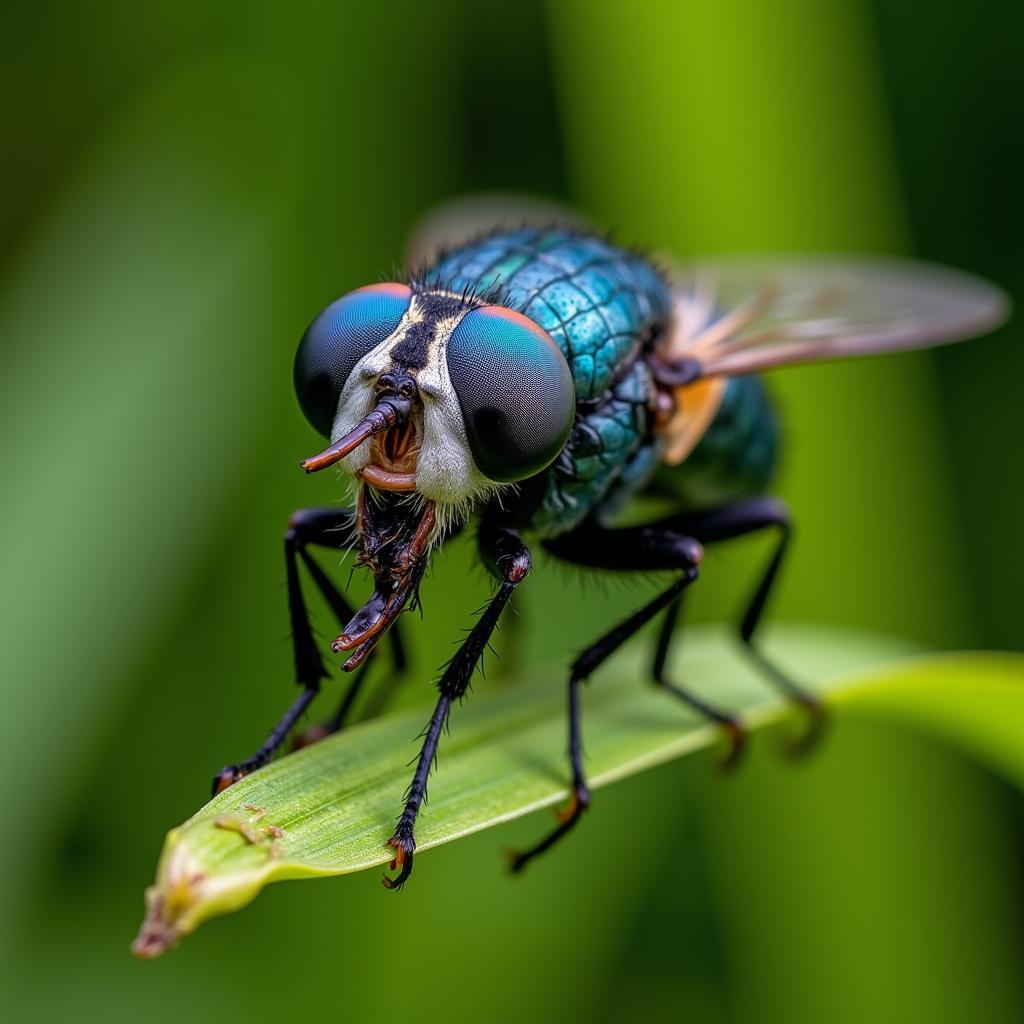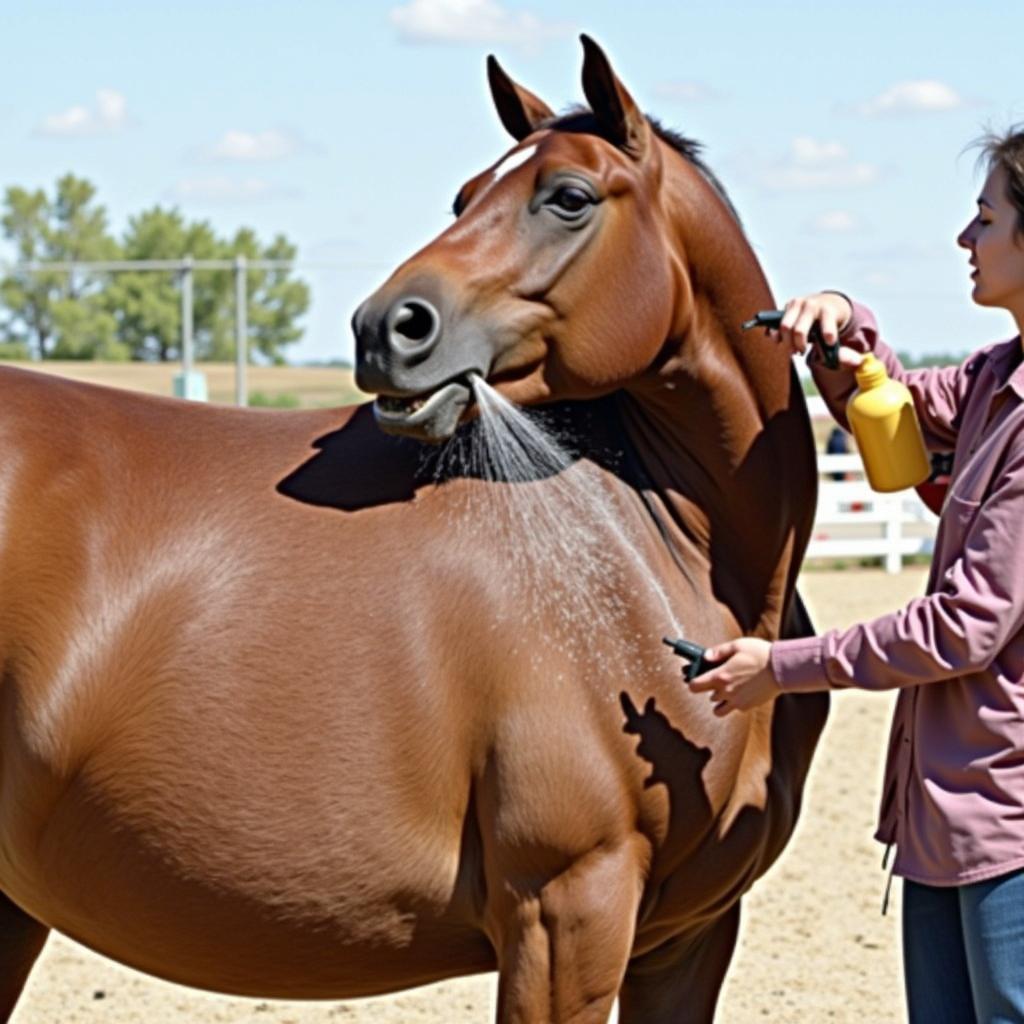The Blue Eyed Horse Fly, a fascinating subject for horse owners and enthusiasts, presents a unique blend of beauty and potential nuisance. These flies, known for their striking iridescent eyes, can be more than just a visual curiosity. Let’s delve into the world of these insects and understand their impact on our equine companions. blue eyed horses
What is a Blue Eyed Horse Fly?
Blue eyed horse flies belong to the Tabanidae family, a large group encompassing various biting flies. Their most distinguishing feature is their large, brightly colored eyes, which often exhibit shades of blue, green, or even gold. While visually captivating, these flies are also known for their painful bite, primarily targeting livestock, including horses. This bite can be more than just irritating; it can transmit diseases and cause significant discomfort.
Why are Blue Eyed Horse Flies Attracted to Horses?
Horses, with their large size and relatively thin coats in certain areas, present an ideal target for these flies. The flies are attracted to the warmth and movement of the animals, as well as the carbon dioxide they exhale. Additionally, dark-colored horses seem to attract more flies than lighter-colored ones. This preference may be related to the way dark coats absorb and retain heat.
 Blue Eyed Horse Fly Close Up
Blue Eyed Horse Fly Close Up
The Impact of Blue Eyed Horse Flies on Horses
The bite of a blue eyed horse fly can cause various reactions in horses, ranging from mild irritation to severe allergic reactions. These flies use their sharp mouthparts to cut the skin and draw blood, a process that can be quite painful. The resulting wound can become itchy and inflamed, leading to further discomfort for the horse. In some cases, horses may develop hypersensitivity to the fly’s saliva, resulting in more pronounced swelling and irritation.
How to Protect Horses from Blue Eyed Horse Flies
Several measures can be taken to minimize the impact of blue eyed horse flies on horses. Fly sprays specifically formulated for horses are an effective deterrent, creating a barrier that repels these insects. Fly masks and sheets can offer physical protection for the horse’s face and body. Stable management practices, such as regularly cleaning stalls and removing manure, can also help reduce fly populations. blue eyed horses
What are the Long-Term Effects of Blue Eyed Horse Fly Bites?
While individual bites are usually not life-threatening, repeated bites can lead to significant stress and discomfort for the horse. Constant itching and irritation can cause the horse to rub against objects, potentially leading to skin abrasions and secondary infections. In extreme cases, anemia can develop due to excessive blood loss from multiple bites.
Are There Any Natural Repellents for Blue Eyed Horse Flies?
Certain essential oils, such as citronella, lavender, and eucalyptus, have shown some repellent properties against flies. These oils can be diluted and applied to the horse’s coat, creating a natural barrier. However, it’s important to use these oils with caution, as some can be toxic to horses if ingested or applied in high concentrations. Always consult with a veterinarian before using essential oils on your horse.
“Regularly inspecting your horses for fly bites and taking appropriate preventative measures can significantly improve their comfort and overall well-being,” advises Dr. Amelia Shepherd, DVM, specializing in equine health and wellness.
 Applying Fly Spray to a Horse
Applying Fly Spray to a Horse
Conclusion
The blue eyed horse fly, while visually striking, poses a real threat to the comfort and health of horses. Understanding their behavior and implementing appropriate preventative measures can significantly reduce the impact of these biting insects. By prioritizing fly control strategies, we can ensure our equine companions remain happy and healthy throughout the fly season. Remember, proactive management is key to protecting your blue eyed horses. blue eyed horses
“Early intervention and consistent fly control are essential for preventing complications arising from blue eyed horse fly bites,” adds Dr. James Wilson, PhD, an entomologist specializing in pest control for livestock.
FAQ
- What attracts blue eyed horse flies? Warmth, movement, carbon dioxide, and dark coat colors.
- How can I protect my horse from these flies? Use fly sprays, masks, sheets, and practice good stable management.
- Are blue eyed horse flies dangerous? Their bites can be painful, transmit diseases, and cause allergic reactions.
- What are the long-term effects of bites? Stress, skin irritation, secondary infections, and potential anemia.
- Are there natural fly repellents? Some essential oils, like citronella and lavender, offer some repellent properties.
- What should I do if my horse gets bitten? Clean the wound and consult a veterinarian if necessary.
- How can I reduce fly populations around my stable? Regularly clean stalls, remove manure, and manage standing water.
Need assistance? Contact us at Phone Number: 0772127271, Email: [email protected] or visit us at QGM2+WX2, Vị Trung, Vị Thuỷ, Hậu Giang, Việt Nam. We have a 24/7 customer support team.
You may also be interested in these other articles on our website: Care Tips for Blue Eyed Horses, Common Horse Fly Species, and Understanding Equine Health.